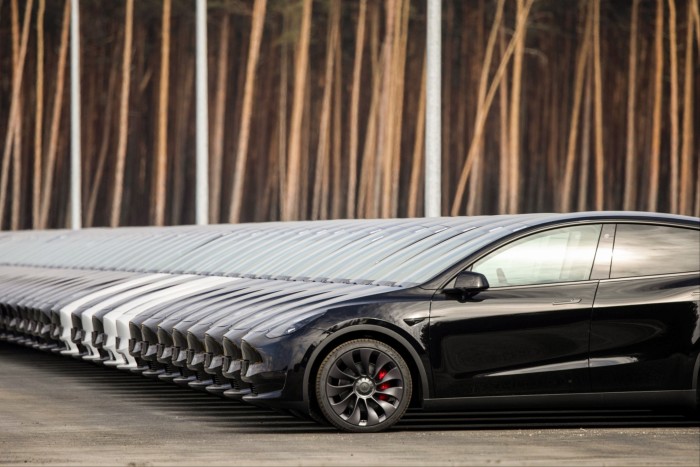Growing green awareness gives eco-innovation a competitive edge

Simply sign up to the Business education myFT Digest -- delivered directly to your inbox.
Despite growing calls for private sector engagement in tackling climate change, there remains a school of thought that the environment is outside the remit of business or actively detrimental to productivity, profitability and economic growth.
Yet evidence is building against this Friedmanite view. Climate-friendly actions, such as cutting production emissions and setting net zero targets, can boost shareholder value, and consumers appear to prefer environmentally conscious choices such as sustainable packaging and clean energy.
The automotive industry provides a good illustration, with rising demand for Teslas and other electric vehicles standing in stark contrast to the decline of diesel car sales in the wake of the 2015 emissions scandal. Before “dieselgate”, consumers were willingly paying a premium for diesel, which many perceived to be an economical and environmentally friendly option. The shift suggests that developing clean, sustainable and innovative products might provide a competitive advantage, as long as the environmental benefits are genuine.
These innovations might cost more to develop and produce, but the competitive edge may make them worth the expense. Furthermore, if enough consumers are initially willing to pay extra to make this a practical approach then, over time, the impact on the direction of innovation should see the cost come down, making clean technology cheaper than more environmentally harmful alternatives.
So, are consumers’ environmental beliefs cheap talk that will fade in the face of premium prices? Or powerful market motivators that can influence the success of products and create value? And does competition encourage or discourage innovation in sustainable products and practices?
FT Business School Insights: Sustainability

Research by leading professors, features and academic and business opinion. Read the report here.
With colleagues from Princeton, London School of Economics, Insead and Collège de France, I examined these issues in a recent study. First, we developed a new economic model of competition that combines the Schumpeterian idea of “escape competition” — in which neck-and-neck competitors innovate in order to gain an edge — with the possibility that consumers might inherently value the environmental aspects of a product. We used data on innovation in the automotive industry as a test case for this model.
We measured pro-environmental sentiment by analysing population surveys in 25 countries, which asked people if they would be willing to pay higher prices for environmentally friendly products. This showed that where pro-environmental sentiments increased, businesses more exposed to these markets intensified innovation in electric, hydrogen and hybrid technologies, and reduced innovation in combustion engine technology. This effect was stronger for companies in more competitive markets.
Interestingly, we also found that over a sustained part of our sample period — 1998 to 2012 — worldwide pro-environmental sentiment declined on average. However, this period still saw an overall increase in clean innovation efforts due to a sharp rise in fuel prices and increased competition. Comparing these observations, our analysis suggests that a combination of increases in pro-environmental attitudes and product market competition can have the same effect on green innovation as a 17 per cent rise in fuel prices worldwide.
This could have practical implications for policymakers, who often face strong opposition to efforts to introduce meaningful carbon price signals — for instance through carbon taxes (the French “gilets jaunes” protests being a recent case in point). Our results suggest that efforts to shift environmental attitudes — for example through education in schools or funding for grassroots campaigns — could offer tangible benefits while being politically much less toxic.
There are lessons for business, too. Given that some consumers are willing to pay more for greener products, companies might consider a new mindset. Rather than seeing climate mitigation as a regulatory burden, they should see it as an opportunity — environmentally friendly approaches can yield both profits and a competitive edge. Initially, this advantage might be reliant on a subset of consumers willing to pay higher prices but, over time, it could reach a tipping point after which cleaner products can also compete on price with more polluting alternatives.
This offers a practical, market-led route to universal adoption of clean technologies. However, as the diesel emissions affair taught us, there is a heavy price to pay if approaches and innovations are not backed up by tangible environmental benefits. Mere greenwashing is not enough to convince savvy consumers in the long term.
Philippe Aghion, professor, London School of Economics, Insead and College de France; Roland Bénabou, professor, Princeton university; Ralf Martin, associate professor, Imperial College Business School; and Alexandra Roulet, assistant professor, Insead, are co-authors of Environmental Preferences and Technological Choices: Is Market Competition Clean or Dirty? (American Economic Review Insights, 2023)

Comments